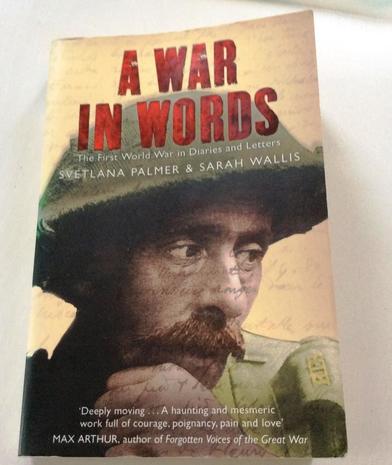
One of the many insights offered by these personal writings are the preconceptions of The Other - and how they affect the writer's thinking and actions.
Vasily Mishnin, on the Russian front line sector of the Eastern Front north of Warsaw, writes in January 1915:
The Germans are putting their trench in order, and we can see them taking their mess tins to fetch water... This is our enemy? They look like good, normal people, they all want to live and yet here we are, gathered together to take each other's lives away.
German officer Ernst Nopper, stationed in Poland in 1915, writes of a Polish fortress town that has fallen to the German advance against Russian troops:
Inside the fort I was particularly surprised by how clean the barracks are, everything is scrubbed and bleached ... we are wrong to accuse the Russians of being sloppy and untidy all the time. In one of the areas abandoned we found several paintings wrapped in newspaper. I was very surprised to find they were of a rather high quality. We should really ask ourselves why we think so little of the Russians. But it is true that culture hasn't really got through to the ordinary people here, unlike in Germany.
His next entries go on to illustrate, in addition to seeing the Slavic peoples as somehow lower in worth than Germans, the deeply anti-Semitic views which were widely held in Germany and which were to contribute to the rise of Nazism just a few short years later.
French officer Paul Tuffrau fights in the Battle of Verdun, which I recall learning at school in the 1960s, 'bled France white' - the campaign, which, like the Somme, was designed to draw German forces into two large divided fronts. On 25 December 1916, by which time the battle has been going on for 300 days, with 352,800 German casualties, and 348,300 French, he writes:
At 6pm I leave in the dark and the rain to visit the A-33 trench area, which cannot be reached in daytime. Beaudoin, the officer commanding, tells me that around three o'clock the Fritz, 250 or 300 metres away, sang them Christmas carols in French, beautifully.
And in February, after two weeks on leave:
... the men's faces are contorted by the cold and exhaustion. Red-rimmed eyes, red noses, pale skin, blue ears, beards hung with icicles. Sweat freezes right away and looks like snow on the horses' backs and on the men's overcoats. Our shoes cannot grip on the frozen earth as we march.
Many confided their innermost thoughts to their diaries, which they took care to keep hidden, for obvious reasons.
Paul Tuffrau records a conversation with General Mangin, second in command at Verdun, when the former attempts, unsuccessfully, to secure leave for his men, who unlike the British, are only allowed one day of rest after each 24 days on the front line:
Then, with a brief salute, he went back into his well-heated private office where it's easy to avoid the reality and talk of the greater good. As for me, I was stunned by his extraordinary refusal to acknowledge the courage of the men ... That night, after hearing this 'heroic' pep-talk, I led my men along the tracks that were horribly muddy and slippery. Some of them were crying with exhaustion and rage.
Turkish officer Mehmed Fasih is stationed at Gallipoli, and writes, in November 1915:
A great chasm exists between the fellows who do all the fighting and those who merely talk about heroism and victory ... what a tragedy it will be if all men who are still fighting here have to die like their predecessors. Just so that a handful of cowards can enjoy a taste of fame.
At 21 years of age, he writes that his hair and beard have grown grey already, and that his moustache is white.
The chapter In The Bush shows how the war extended, among other places, to Africa, where there was a renewed scramble by the European powers with already established colonies for territorial gains, and subsequent huge damage to the people of the African nations caught up in the conflict. African porters and labourers were used by both sides, and an estimated 100,000 to 120,000 employed by the Germans and as many as 250,000 recruits on the British side perished from malnutrition, disease and accidents. A further 300,000 native East Africans died as a result of famine caused by war recruitment and requisitioning. German settler Dr Ludwig Deppe, who provided medical support to the German forces, wrote, a year after the end of the war:
Behind us we have left destroyed fields, ransacked magazines, and, for the immediate future, starvation. We were no longer the agents of culture; our track was marked by death, plundering and evacuated villages.
The chapter on The War at Sea contains an account by Johannes Spiess, Watch Officer on U-boat U-9, of his, and the submarine's, first patrol mission in the North Sea, six weeks into the war, and the jubilation of the crew when they sunk three British light cruisers, two of which, HMS Cressy and Hogue, had gone to the rescue of the first, HMS Aboukir. Although I'm sure a British crew would have done more or less the same, (though earlier Royal Navy officers, and I'm referencing Patrick O'Brian's fictional Captain Jack Aubrey, would surely have regarded it as deeply unethical to attack a ship without any warning, from a hidden position) I found it quite shocking to read this, as the Chief Yeoman of Signals on the Aboukir, Alfred Assiter, is named on our local War Memorial, and less than a month later, the U-9 would sink HMS Hawke, on which two more men from my town perished. As a non-combatant, and one who, unlike my older relatives, has been fortunate enough not to have lived through a war, it is naturally in those moments when I make a personal connection that I feel the horror of war most keenly. I understand that there has been a big reaction to Peter Jackson's We Will Remember Them among young people, who have suddenly seen the soldiers as resembling those living now rather than flickering distant black and white history.
Particularly moving are the diaries featured of two children - Yves Congar from Sedan, a town in north-eastern France, and Piete Kuhr from the East Prussian town of Schneidemuhl.
Yves' father is one of a number of men taken hostage to ensure the compliance of the town's population, and sent to Germany to work. Yves himself narrowly escapes detention, at 14, after having being reported calling the occupying Germans the 'Boche'.
Piete, initially patriotic, becomes disillusioned as time goes by, and writes, in February 1918:
I don't want any more soldiers to die. Millions are dead - and for what? For whose benefit? We must just make sure that there is never another war in the future. We must never again fall for the nonsense peddled by the older generation.
So, just a few extracts picked out from a superb anthology which I can highly recommend to those readers who, like myself, are not so much students of military history, but of humanity in times of war.

 RSS Feed
RSS Feed
